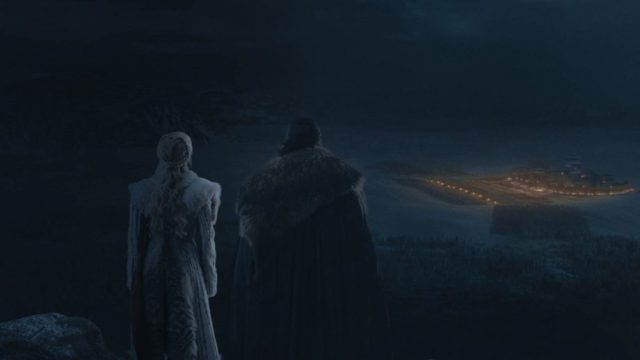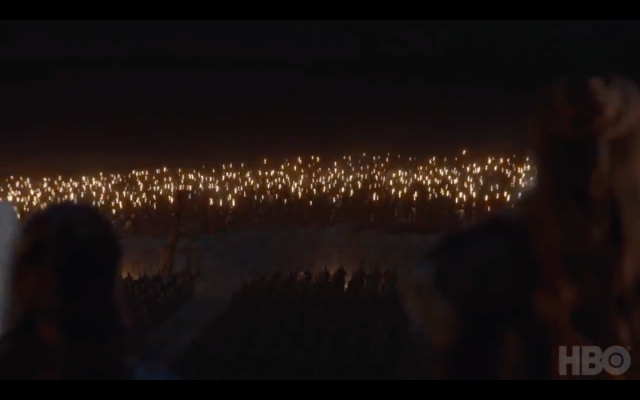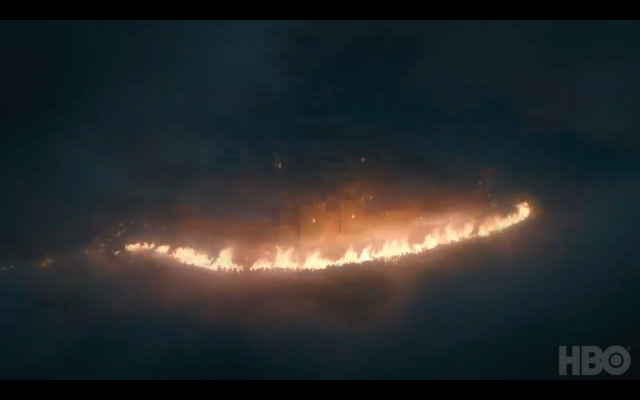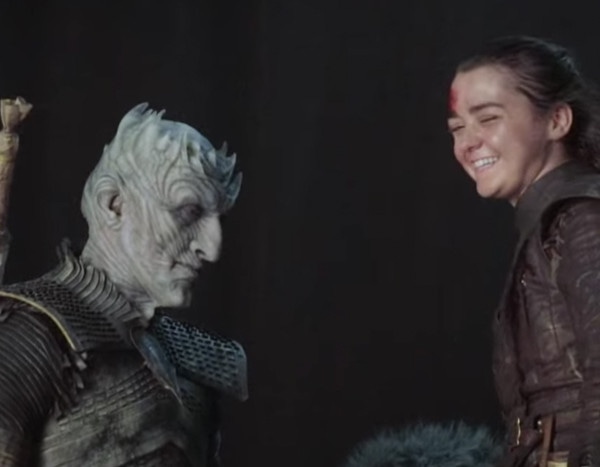Spoilers ahead for Game of Thrones, season 8, episode 3, “The Long Night”
As Game of Thrones moves into the second half of its final season, we’re in the endgame — not just for the remaining contenders for the Iron Throne, but also for the behind-the-scenes string-pullers with their own grandiose plans for the fate of Westeros. Littlefinger’s cunning, Varys’ spy networks, Tyrion’s battle strategies, and Melisandre’s prophecies and fire magic have all been involved in manipulating and shaping the kingdom’s current chaos. But the show has not been friendly to any of its masterminds.
In the season 8 premiere, Varys, Tyrion, and Davos Seaworth watch Jon Snow and Daenerys Targaryen from a distance, musing over their suitability as a marriage alliance. “You overestimate our influence,” Varys says. “Jon and Daenerys don’t want to listen to lonely old men.” Tyrion protests, “Our queen respects the wisdom of age.” Varys quips back, “Of course she does. Respect is how the young keep us at a distance so that we don’t remind them of an unpleasant truth… that nothing lasts.”
Varys isn’t wrong about his own diminished social influence. In the past three seasons of Game of Thrones, as the show has diverged from George R.R. Martin’s sourcebooks, showrunners David Benioff and D.B. Weiss have relegated all of the advisers, sages, and prophets to the side, treating them as dusty old relics. The former schemers and pundits have laid out epic plans, but then they’ve consistently been sidelined and outsmarted by characters who are supposed to be less witty and observant, less influential and careful, or less crafty.
First, there’s Varys, whose purported goal was to improve the lives of common people and do what’s best for the realm. He served the Mad King, crossed over to help Robert Baratheon and spy on Dany when she was a young girl, and finally declared his true allegiance to her as a just queen. He’s an extremely resilient man, with a network of child spies. But by season 8, Varys has ceased to have any hand in driving the plot. He’s barely even present. He’s taken a back seat to Daenerys, who does what she wants regardless of his counsel. He also loses the major kills he commits in the books, murdering Pycelle and Kevan Lannister to protect Tyrion. In the show, Qyburn kills Pycelle, and Cersei Lannister kills Kevan as part of her Sept of Baelor wildfire attack. It’s a cleaner version of the story, but it undermines Varys’ ruthlessness and commitment to his cause.
:no_upscale()/cdn.vox-cdn.com/uploads/chorus_asset/file/16202113/f36185aa337ded26b89a48291055c9bcac5e6ca9a390e6885adc4ac9ef5923332fe4ad14640ca3d030464e31f5021d27.jpg)
Part of this can be explained by the showrunners’ emphasis and focus on more physically active, traditional heroes like Jon Snow and Arya Stark. We’re running out of episodes, so if Varys has any elaborate plots left, they could only be addressed in a spinoff, a sequel, or, better yet, George R.R. Martin’s unfinished books. Varys gets no lines during Jaime’s trial, although court manipulation is one of his specialties, and he just barely survives by the skin of his teeth in the crypts. (Somehow neither he nor Tyrion anticipates that the crypts aren’t safe against an opponent who raises the dead!)
Over and over throughout the last few seasons, we’ve seen this pattern repeat: the showrunners keep their prophets and geniuses dull and unaware to make it easier to spring surprises on the audience. That’s why the Night King can survive fire, defying the story’s established rules for the undead. It’s not because of some secret history; it’s because surprises make for startling entertainment. This isn’t a huge grievance, but it’s worth mourning, for a moment, the metaphorical death of George R.R. Martin’s smarter characters.
:no_upscale()/cdn.vox-cdn.com/uploads/chorus_asset/file/16200659/061a76cb321c8db0782c012a77c5f6c7a502cd17c9882c5aa3a8f5d23c6ea4ad8d6c4bb2216e25cc042c40479e598f22.jpg)
Martin has said in interviews and on his LiveJournal that Tyrion is his favorite character and that he takes great pleasure in crafting dialogue for him, but it takes time. After season 5, the showrunners had to improvise their own glib lines for Tyrion, which leads straight into him making familiar gibes at Varys for not having balls. What’s worse, Tyrion consistently underestimates his sister Cersei and falls for her lies. He gives Daenerys awful advice that betrays her allies and the story that she rightly ignores. He spends all of season 7 consistently failing and moping, perpetually helpless and on the sidelines as terrible things happen.
His failing wits and charm aside, the utter failure of his former military acumen is the narrative blunder that feels most out of character. Fans have taken issue with Tyrion’s advice to Daenerys not to march on King’s Landing or at least lure out Cersei’s forces in season 7 in a battle that would have avoided civilian casualties. His decisions might not make strategic sense, but they’ve helped the showrunners delay the epic battles until Game of Thrones’ final season, keeping Cersei alive to increase tension. They just came at the cost of Tyrion’s logic and common sense.
:no_upscale()/cdn.vox-cdn.com/uploads/chorus_asset/file/16202023/07f91a6657d54dcafedf45a80fd942a4f060bbbfb33bd664c400fdb5a92bd730.jpg)
Then there’s Melisandre who was totally underwhelming in fulfilling her final prophecy. She told Varys in season 7 that they’ll both die in Westeros, and in season 8’s massive battle in “The Long Night,” she tells Davos not to bother killing her because she’ll be dead by dawn. Both lines imply she’ll have some sort of epic death, and that the prophecy of the Prince that Was Promised, aka Azor Ahai, will be complete. That isn’t exactly what goes down.
In season 8, the Azor Ahai prophecy basically falls apart. According to prophecy, there should be a hero “born again amidst smoke and salt” who wakes “dragons out of stone.” The description sounds like it could apply to Jon or Daenerys, but Melisandre and Beric, who are both servants of the Lord of Light, give up their lives in order to keep Arya alive to slay the Night King. Her parting words to Arya are more or less, “Hey, you killed some blue eyes, just like I said you would.” So maybe Azor Ahai doesn’t matter so much? In the season 6 finale, Melisandre tells Jon Snow, “I’ve been ready to die for many years. If the Lord was done with me, so be it, but he’s not.” Yet, without looking for a clear sign that the lord was done with her, without resolving Westeros’ ongoing battles, without explicitly fulfilling the terms of her prophecies or explaining what’s going on, without even mentioning where she went for two seasons, Melisandre voluntarily ends her life by walking off into the distance and disintegrating into dust.
:no_upscale()/cdn.vox-cdn.com/uploads/chorus_asset/file/16202028/5defa13615b7502d70fa93a448ba2a7630dabb7a9cf7ffaab8ef5ce26fa2d019c7ccc79e9a936502a7e6c06cb0a8a9ef.jpg)
The highly unsatisfying conclusion to her storyline indicates that either Melisandre and other Red Priestesses of the Lord of Light were all wrong, or that the showrunners are just chucking out this piece of Game of Thrones lore in favor of focusing on more popular characters.
Melisandre’s seemingly random, anticlimactic death isn’t the first time the show has disposed of someone with the long game in mind. Petyr Baelish, better known as Littlefinger, was also poorly served by the writers over the course of seasons 5 through 7 before he met his untimely demise, which hasn’t happened in the books yet. A lot of it has to do with plot choices. Sansa didn’t have much to do in the later books, besides hanging around the Vale, so the showrunners gave her Jeyne Poole’s storyline, with Littlefinger arranging for her to marry sadistic murderer Ramsay Bolton.
This adaptation choice unfortunately made Littlefinger look stupid. Apparently, he didn’t have any idea what sort of a person Ramsay was or that he was putting Sansa in the hands of a bloodthirsty rapist. He eventually admits to Sansa that he made a mistake, but it’s hard to swallow, given Ramsay’s outsized behavior and how clever and aware Littlefinger is supposed to be.
In the books, Littlefinger instead offers to marry Sansa off to his heir, Ser Harrold Hardyng, who’s a mild jerk. But he’s no human-hunting, victim-flaying Ramsay Bolton, and he’s under Littlefinger’s control. We also know less about Littlefinger’s end goals in the books, and the added sense of mystery means he might have a pivotal role in the endgame. The show’s version of Littlefinger is a slimy weasel who ultimately tries to clumsily pit Sansa and Arya against each other. He deserves his execution for his sloppiness alone. But he’s also written as a straightforward schemer who is out to grab as much power as possible and seat himself on the Iron Throne. In some senses, he’d become too boring and basic to keep around.
:no_upscale()/cdn.vox-cdn.com/uploads/chorus_asset/file/16200682/aac2eca45f84f31294b837acd67c4ebf113dee0f580271bcf47d15ca47599697535d7bd7e12fd0e37d19cd8c56686ad1.jpg)
It’s ridiculous to expect the showrunners to devote any sort of time to developing their geniuses and prophets when they only have three episodes left, especially since they seem to want to devote them all to straightforward action and romance. Unfortunately, for the sake of building up battles and putting Arya, Sansa, Daenerys, and Jon Snow in the spotlight, the puppetmasters pulling the strings have been cut off. The resulting simplicity is a blow to a longform story that likely wouldn’t have commanded this much attention if it had always been this uninterested in its undercard players. Stories as varied as Westworld, Avengers: Endgame, and Naruto bring in audiences with the sense of grandmasters playing 4D chess with the world. Exchanging that for easy thrills and sleight-of-hand tricks feels like a quick, boring victory after a long, worthy buildup.
We still have one prophet left on the center stage: Bran Stark. He didn’t do much during the Battle of Winterfell, except sightseeing as some crows and failing to pass along any useful intel to his allies. But he supposedly sees fragments of the future and is guiding everyone else along the journey. Given how poorly every other fortune-teller and chessmaster on this show has been treated, expectations for Bran shouldn’t be set too high. But he does have some major advantages. He’s a Stark, and his proximity to the other main characters might give him plot armor so he isn’t killed off. His powers could keep him safely on the sidelines. The story has said his death would be disastrous to humanity — it was the Night King’s stated goal — and with so much effort made to preserve him, he probably won’t die anytime soon. Best of all, he’s one of the key people vouching for Jon Snow’s identity as the true heir to the Iron Throne. All of this might just be placing a target on his back, but it could also suggest he’ll actually be relevant in the upcoming chain of events.
https://www.theverge.com/2019/4/30/18522060/game-of-thrones-got-season-8-hbo-final-melisandre-tyrion-lannister-long-night-prophecies-tactics
2019-04-30 17:21:07Z
52780278583549








